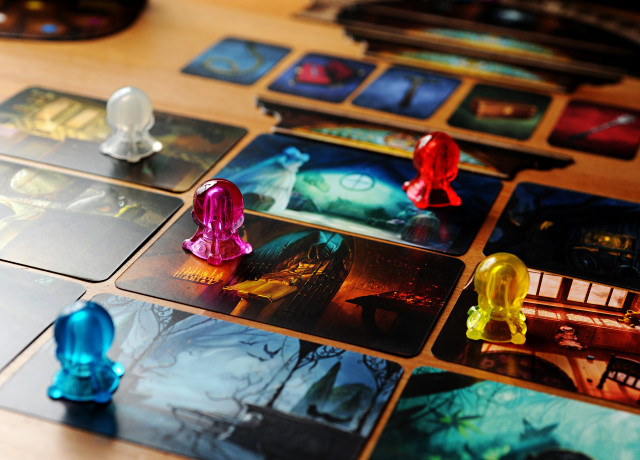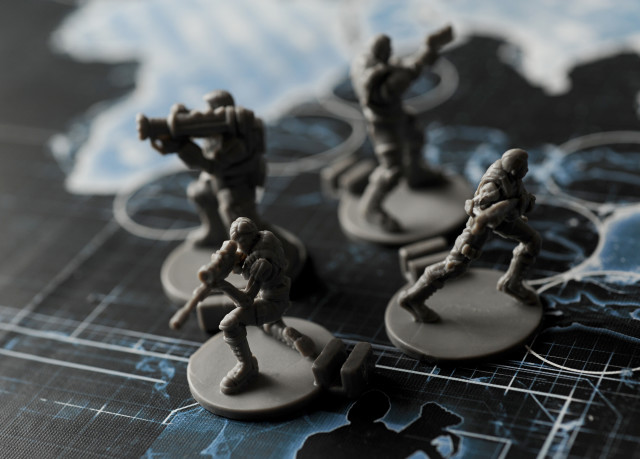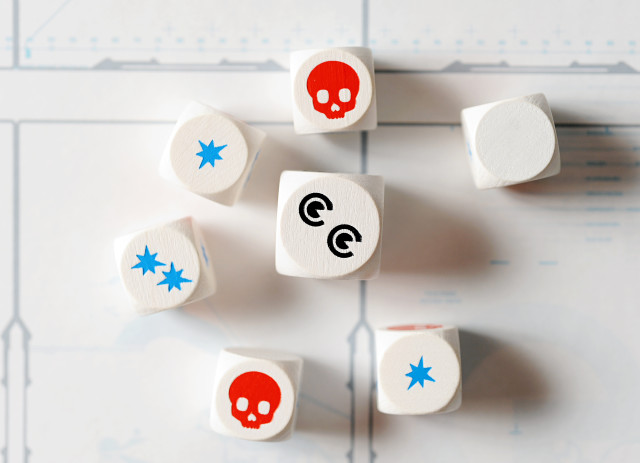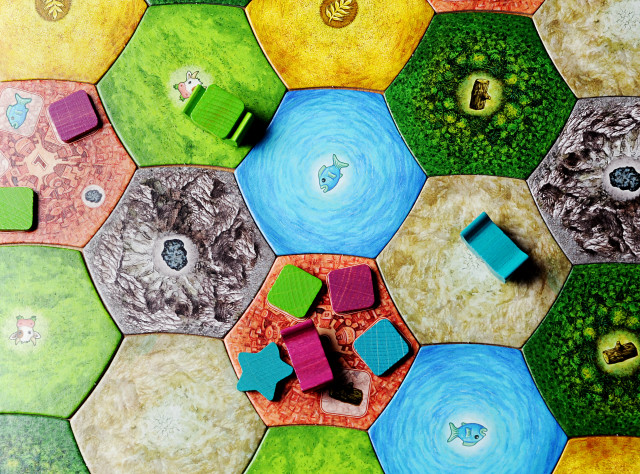Full disclosure: I have not played every game released in 2015. However, I have played (according to my app) about thirty of them, I have played over 500 different games in my lifetime, and have read about many others. If you don’t feel that establishes my credentials sufficiently well, you might as well click ‘Back’ on your browser and read another one of the DWP’s fine authors.
What makes a board game ‘innovative’? There are many definitions, but this is mine: an innovative board game brings something new to the table, be it theme, mechanic, presentation, or simply the experience of playing the game.
And, as in any creative endeavour, innovation gets harder and harder the older an artform gets; it’s harder to break new ground when so much ground has already been…well…broken. So while a game about medieval merchants turning raw materials into finished goods would have been innovative in 1995, it would definitely a radically new mechanic to make it innovative in 2015.
Here then is my list. These are not the ten best, merely ten which I believe brought something new to the board gaming experience. My entries are not numbered except for the final one—if innovation is hard to define, it is next to impossible to quantify.
Mysterium: Take Clue, make it cooperative, add a heavy dose of Dixit, and design components which immerse the players completely in the

Mysterium
drama, and you have Mysterium. One player plays as the Friendly Ghost who has been foully murdered; the other players are psychic detectives who are trying to piece together the Who, Where, and How. The Ghost can only communicate through surreal “visions”, trying as quickly as possible to link up detectives with suspects and MO’s.
Rattle, Battle, Grab The Loot: Towards the end of the year several games came out borrowing Tumblin’ Dice’s twist on dice rolling—not only the result but the location of the dice roll matters—and adding a theme. I believe (but am not sure) that this game was the first to hit stores. Players can customize their ships, battle each other, and search for booty. A variety of scenarios gives good replay value.
Churchill: Churchill can be considered a prequel to Twilight Struggle (BGG’s #1 game) as it is starts in 1943 and ends (usually) with the collapse of Germany and Japan in 1945. It is rare for requiring three and exactly three players, to stand in for Roosevelt, Churchill, and Stalin, as they tried to cooperate to win WWII even as they jostled for position in the post-War world. The game has earned some controversy over its victory conditions, which some consider too random and swing-y, but I feel Mark Herman, the designer, has more than justified his approach in the notes included with the game, not to mention several long and thoughtful posts on BGG.
Hostage Negotiator: A Kickstarter game with a unique theme (the title says it all) and mechanics, you really feel like the guy from the TV show Flashpoint trying to buy time to save your hostages and/or take down the bad guy. There are expansions you can buy to add to replay value, and the game is HARD, but I think the designers worked hard to come up with some unique twists on deck-building and action-points that totally immerse you in the game. A very stressful experience!
Flick’em Up: The designers have taken Pitch Car and Catacombs and upped the ante by using cute and evocative components to creative a Wild West world in which players control their characters by flicking them around the tabletop. A streamlined set of rules and a wide variety of different scenarios makes it easy for kids and adults alike to put themselves in the action.
XCOM: The Board Game: Board game ports of video games usually stink. This is usually because it is so hard to maintain the immediacy of action that you get in a video game and translate it to the tabletop. Eric  Lang, the designer of XCOM:TBG, overcomes this by using technology (in this case, an iPad or web app) to recreate the moment-to-moment tension of the video game. The app not only imposes time limits, but also acts as a randomizer and organizer, and provides atmospheric sound effects. Without the app, the game would be a relatively tame cooperative experience.
Lang, the designer of XCOM:TBG, overcomes this by using technology (in this case, an iPad or web app) to recreate the moment-to-moment tension of the video game. The app not only imposes time limits, but also acts as a randomizer and organizer, and provides atmospheric sound effects. Without the app, the game would be a relatively tame cooperative experience.
The Grizzled: Games about World War One are rare, since so much of the war took place on static frontlines. In the Grizzled players take the roles of French “poilus” in the trenches of The Great War. It is unique in that it is not about fighting so much as it is about overcoming the strains and fears of wartime; players are there to help each other survive instead of backing each other up in battle. Its message is one of camaraderie in the face of the madness of war.
Time Stories: Many boardgames have tried to take the tabletop role-playing experience and compress it into a single evening. Time Stories took the point-and-click video game RPG experience and ported it to the

T.I.M.E. Stories
tabletop, adding a time-management element which necessitates repeated plays in order to figure out the most efficient way to “beat” a particular scenario. Players take the role of “time cops” who inhabit bodies as a way of linking to the past and preventing time crime. The game has been criticized for having limited replayability since once you “solve” a scenario you can’t really go back and play it again, and the base game only contains one scenario. Still the first expansion module has been released, and I think the game is a viable option for those looking for a story-telling experience without the need for a full-length campaign a la Descent.
Baseball Highlights: 2045: Set in a near-future when robots have infiltrated the Major Leagues, the designers of BH:2045 have figured out how to compress the action of a full-length baseball game into fifteen exciting minutes using a truly unique set of cards and rules. Each card represents a player who may or may not have special abilities and who represents a series of at-bats instead of a single one. As well, players can be used to purchase “free agents” who can strengthen your deck/team. Add solo and campaign modes and the possibility of league play and you have one of the most elegant baseball sims out there—not even including the Kickstarter addons.
MOST INNOVATIVE:
504: Remember those books when you were a kid, where you could flip the panels so that you had the head of one monster, the body of another, and the feet of yet a third? Friedmann Friese, the designer of such classics as Power Grid, Friday, and Copycat, has taken that idea to the 504th  degree by giving you nine options for accruing VPs, income generation, and secondary mechanic, and letting you mix and match to your heart’s desire. The result is essentially a game kit which contains 9 x 8 x 7 = 504 different games. I have only played three of them so far, but they were all viable games with different feels. You could, for example, have a game where the primary goal was a to build roads to connect hexes, where income was generated by pick-up and delivering goods from city to city, and where players got bonus points for connecting a majority of each terrain type of hex. Or you could have a game where players explored an unknown map, could fight each other for territory, and can buy and sell shares in each others’ companies. Of course, none of the games has a theme per se; the true innovation is the gargantuan effort Friese has put in to create a seamless “euro” experience regardless of which rules you pick. Not all 504 games may be great, but they all work. On that basis alone, 504 gets my vote for most innovative board game of 2015.
degree by giving you nine options for accruing VPs, income generation, and secondary mechanic, and letting you mix and match to your heart’s desire. The result is essentially a game kit which contains 9 x 8 x 7 = 504 different games. I have only played three of them so far, but they were all viable games with different feels. You could, for example, have a game where the primary goal was a to build roads to connect hexes, where income was generated by pick-up and delivering goods from city to city, and where players got bonus points for connecting a majority of each terrain type of hex. Or you could have a game where players explored an unknown map, could fight each other for territory, and can buy and sell shares in each others’ companies. Of course, none of the games has a theme per se; the true innovation is the gargantuan effort Friese has put in to create a seamless “euro” experience regardless of which rules you pick. Not all 504 games may be great, but they all work. On that basis alone, 504 gets my vote for most innovative board game of 2015.
Comments
No comments yet! Be the first!